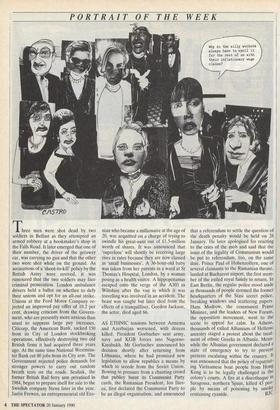PORTRAIT OF THE WEEK
hree men were shot dead by two soldiers in Belfast as they attempted an armed robbery at a bookmaker's shop in the Falls Road. It later emerged that one of their number, the driver of the getaway car, was carrying no gun and that the other two were shot while on the ground. As accusations of a 'shoot-to-kill' policy by the British Army were revived, it was rumoured that the two soldiers may face criminal prosecution. London ambulance drivers held a ballot on whether to defy their unions and opt for an all-out strike. Unions at the Ford Motor Company re- jected an improved pay offer of 10.2 per cent, drawing criticism from the Govern- ment, who are presently more anxious than usual to suppress large pay increases. Citicorp, the American Bank, sacked 150 from its City of London stockbroking operations, effectively destroying two old British firms it had acquired three years ago. At the same time National Westmins- ter Bank cut 80 jobs from its City arm. The Government rejected police demands for stronger powers to carry out random breath tests on the roads. Sealink, the former British Rail-ferry arm privatised in 1984, began to prepare itself for sale to the Swedish company Stena later in the year. Justin Frewen, an entrepreneurial old Eto nian who became a millionaire at the age of 20, was acquitted on a charge of trying to swindle his great-aunt out of £1.5-million worth of shares. It was announced that `superloos' will shortly be receiving large rises in rates because they are now classed as 'small businesses', A 36-hour-old baby was taken from her parents in a ward at St Thomas's Hospital, London, by a woman posing as a health visitor. A hippopotamus escaped onto the verge of the A303 in Wiltshire after the van in which it was travelling was involved in an accident. The beast was caught but later died from the effects of a tranquilliser. Gordon Jackson, the actor, died aged 66.
AS ETHNIC tensions between Armenia and Azerbaijan worsened, with dozens killed, President Gorbachev sent army, navy and KGB forces into Nagorno- Karabakh. Mr Gorbachev announced his decision shortly after returning from Lithuania, where he had promised new legislation to allow republics a means by which to secede from the Soviet Union. Bowing to pressure from a chanting crowd that publicy burnt its Communist Party cards, the Rumanian President, Ion Mes- a', first declared the Communist Party to be an illegal organisation, and announced
that a referendum to settle the question of the death penalty would be held on 28 January. He later apologised for reacting to the cries of the mob and said that the issue of the legality of Communism would be put to referendum, too, on the same date. Prince Paul of Hohenzollern, one of several claimants to the Rumanian throne, landed at Bucharest airport, the first mem- ber of the exiled royal family to return. In East Berlin, the regular police stood aside as thousands of people stormed the former headquarters of the Stasi secret police, breaking windows and scattering papers. Hans Modrow, the communist Prime Minister, and the leaders of New Forum, the opposition movement, went to the scene to appeal for calm. In Athens, thousands of exiled Albanians of Hellenic ancestry staged a protest about the treat- ment of ethnic Greeks in Albania. Mean- while the Albanian government declared a state of emergency to try to prevent protests escalating within the country. It was announced that the policy of repatriat- ing Vietnamese boat people from Hong Kong is to be legally challenged in the colony's courts. A fire at a discotheque in Saragossa, northern Spain, killed 43 peo- ple by means of poisoning by smoke


















































 Previous page
Previous page